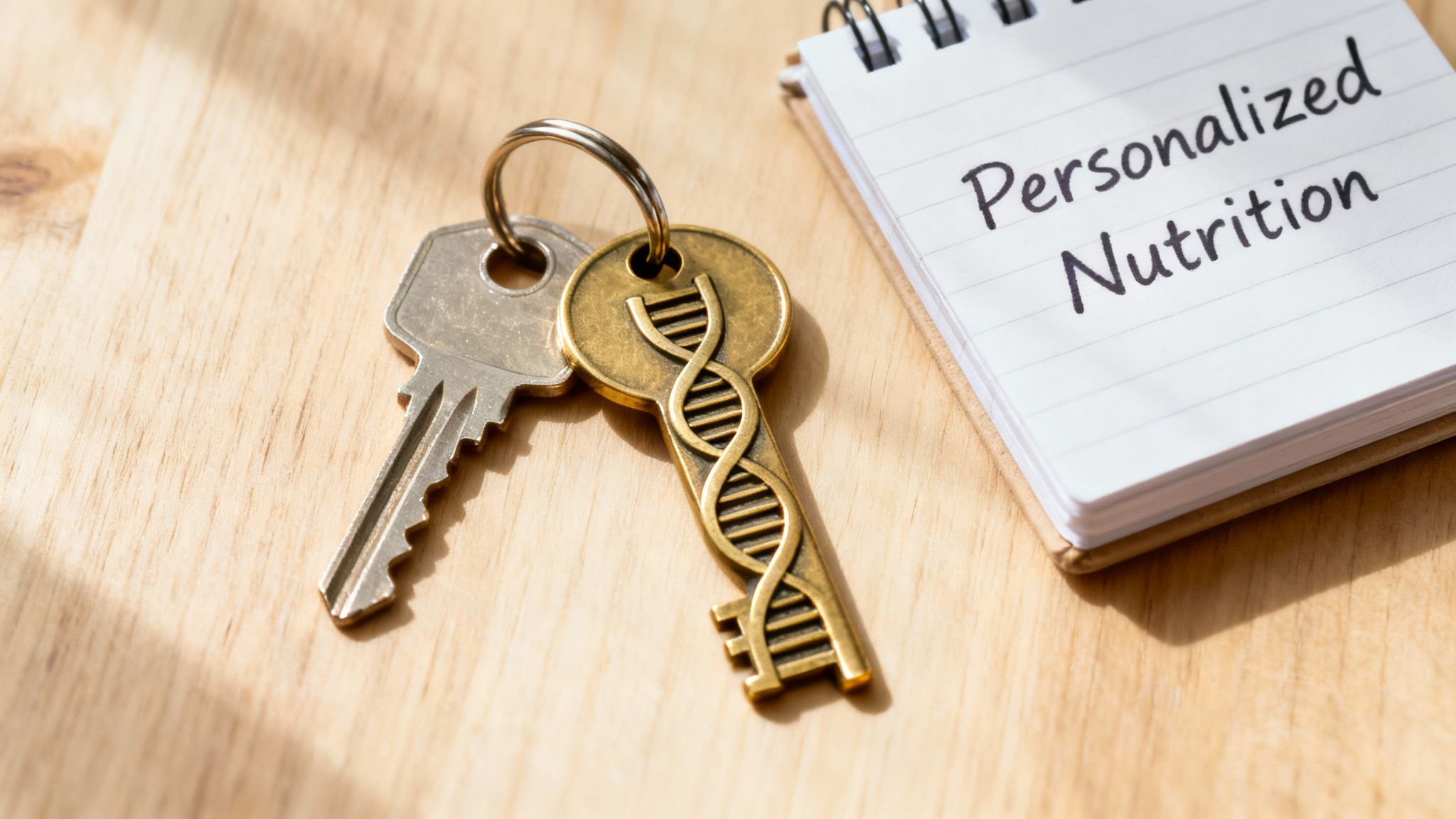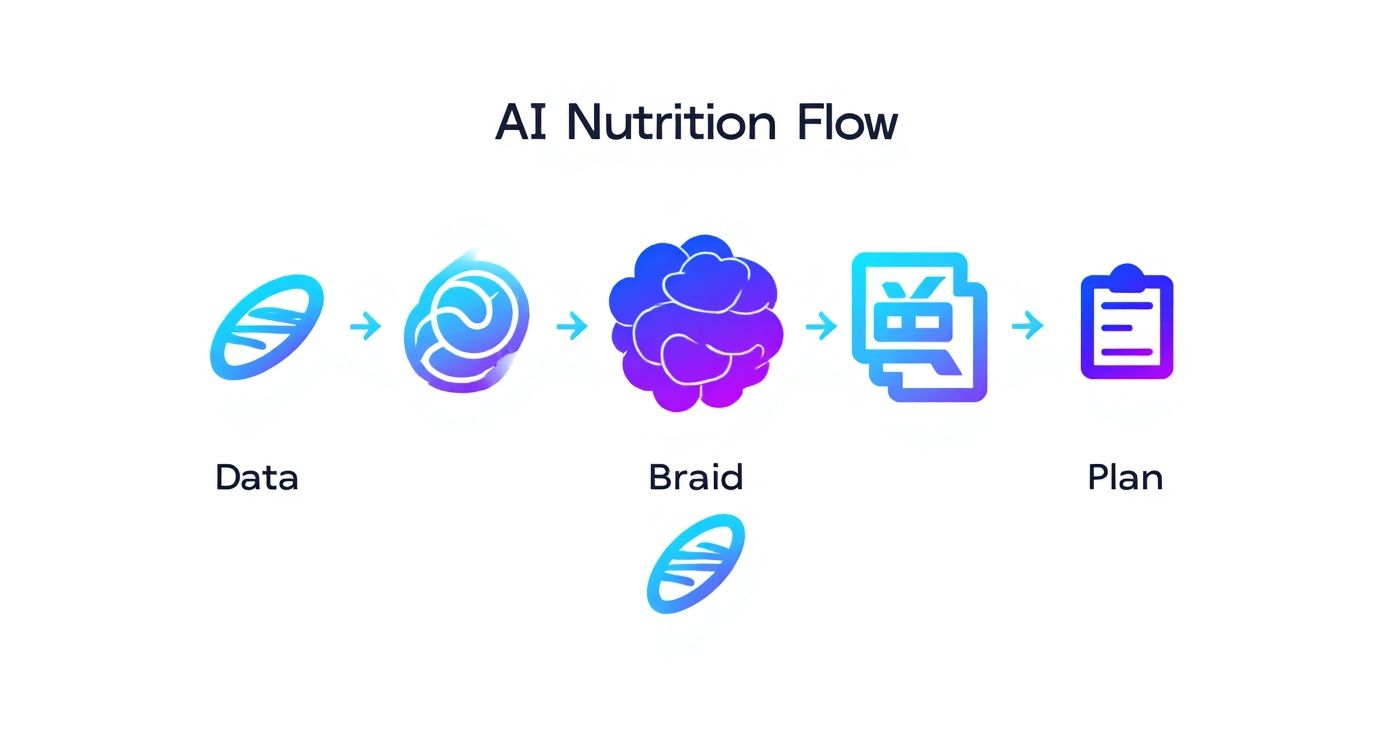
Your Guide to a Personalized Nutrition Plan
Share
A personalised nutrition plan is a way of eating designed specifically for your unique body, lifestyle, and health goals, moving far beyond generic, one-size-fits-all advice. Think of it like having a master key crafted just for your body's specific lock, rather than fumbling with a generic one that only works for a few people. This approach tunes into your individual biology to create a much more effective and sustainable path to feeling your best.
Why Your Health Deserves a Personalised Approach
Ever tried a popular diet that worked wonders for a friend but did absolutely nothing for you? It’s an incredibly common story, and it highlights a fundamental truth: we are all biologically different. What fuels one person to peak performance might cause another to feel sluggish and unwell. This is where personalised nutrition completely changes the game.
Generic diet advice often falls flat because it ignores the complex mix of factors that make you unique. It doesn't consider your genetics, daily stress levels, sleep quality, or specific fitness ambitions. Frankly, it's an outdated model in an era where we can be far more proactive about managing our health.

The Problem with One-Size-Fits-All Diets
Standard diets are built on broad assumptions, treating everyone as if they have the same metabolic engine. This approach can lead to a frustrating cycle of yo-yo dieting because it overlooks the details that really matter. A personalised nutrition plan, on the other hand, is built on a foundation of your own data.
It takes into account crucial elements such as:
- Your Unique Goals: Whether you want to sharpen your focus, balance hormones, build muscle, or simply live a longer, healthier life.
- Your Lifestyle: A plan for a busy professional will look very different from one designed for a competitive athlete.
- Your Health History: It accounts for existing conditions, food sensitivities, and metabolic tendencies you might have.
- Your Preferences: Let's be honest, a sustainable plan has to include foods you genuinely enjoy. It turns healthy eating into a pleasure, not a chore.
To really see the difference, it helps to put them side-by-side.
Standard Diets vs Personalized Nutrition
| Feature | Generic Diet Plan | Personalized Nutrition Plan |
|---|---|---|
| Foundation | Based on broad population averages | Based on your individual biology and data |
| Approach | One-size-fits-all, often restrictive | Custom-fit, focusing on precision and inclusion |
| Factors Considered | Calories, general macronutrients | Genetics, lifestyle, goals, health history |
| Sustainability | Low, leading to yo-yo dieting | High, as it's built around your preferences |
| Outcome | Inconsistent and often frustrating results | More effective, predictable, and sustainable results |
As you can see, the difference isn't just in the details; it's a completely different philosophy.
The Shift Towards Tailored Wellness
The idea of custom-fit health solutions is really taking hold. People are moving away from just reacting to health problems and are instead adopting proactive strategies to feel their best every single day. This shift is crystal clear in the booming wellness market, especially here in the United Kingdom.
The UK's personalised retail nutrition and wellness market generated around $589.42 million in revenue in recent years—that’s a massive jump from just $197.0 million two years prior. This incredible growth shows a powerful demand from people looking for nutritional solutions that deliver real, tangible results. You can find more details about these market trends and explore additional insights into personalized nutrition.
A personalised nutrition plan isn't about restriction; it's about precision. It gives your body the exact fuel it needs to thrive, based on its specific blueprint. This is the new standard for achieving peak physical and mental well-being.
By focusing on your individual needs, a personalised plan empowers you to make smarter, more effective choices. It helps you understand your body on a much deeper level, transforming your relationship with food from one of confusion to one of confidence and control. This is the future of nutrition—a future built entirely around you.
This article is for informational purposes only and is not medical advice. Always consult a qualified health professional before starting any new supplement or major lifestyle change.
The Building Blocks of Your Custom Plan
Creating a truly personalised nutrition plan isn't about guesswork or jumping on the latest health trend. It's more like being a detective, gathering clues from different parts of your life to piece together a strategy that's built just for you.
Think of it this way: a generic diet plan is like a one-size-fits-all t-shirt. It might technically fit, but it's probably not very flattering or comfortable. A personalised plan, on the other hand, is like a bespoke suit, tailored to your exact measurements. It just works better.
This approach goes way beyond the surface, digging into what truly makes you tick. Each piece of information is a crucial building block, giving us a clear picture of what your body needs to feel and perform at its best. Let's break down the five essential pillars that form the foundation of any effective plan.

Unlocking Your Genetic Blueprint
Right at the very core of personalisation is nutrigenomics – the fascinating science of how your genes and your food interact. Your DNA is basically your body's instruction manual, holding vital clues about how you process nutrients, your metabolic rate, and even your predisposition to certain deficiencies.
For example, your genes might show a variation that makes it harder for your body to convert omega-3 fatty acids into their most useful forms, DHA and EPA. With that knowledge, your plan could prioritise direct sources like oily fish or an omega-3 supplement to give your cognitive performance a boost and manage inflammation. It’s precision nutrition in action.
Analysing Your Current Health Markers
If genetics are the blueprint, then blood tests are the real-time snapshot of what’s happening inside your body right now. They measure key biomarkers that reveal your current nutritional status, highlighting any immediate areas that need a bit of attention.
Important markers often include:
- Vitamin and Mineral Levels: Are you running low on Vitamin D or iron? A blood test gives you a definitive answer, guiding any necessary tweaks to your diet or a high-quality multivitamin.
- Hormone Panels: Hormones like cortisol and testosterone are massively influenced by diet and stress, affecting everything from your energy to your mood, impacting both men's and women's health.
- Cholesterol and Blood Sugar: These are crucial for understanding your metabolic health and your risk for long-term conditions.
This data allows your plan to move past general advice and address your immediate needs with targeted support. It helps bridge the gap between your genetic potential and your current state of health.
Assessing Your Gut Microbiome
Your gut is home to trillions of microorganisms that play a massive role in digestion, immunity, and even mental clarity. A gut microbiome analysis can reveal the balance of good and bad bacteria, showing how well you break down foods and absorb their nutrients.
An imbalance could be the hidden reason behind issues like bloating or fatigue. For instance, if your gut struggles with certain fibres, your plan might adjust your intake of specific vegetables. If your microbiome is lacking diversity, it might introduce more probiotic-rich foods to get things back on track and improve your gut health.
A personalised nutrition plan isn't built on a single piece of information. It's the synergy between your genetics, current blood markers, gut health, lifestyle, and goals that creates a truly powerful and sustainable strategy.
Factoring in Your Lifestyle and Activity
A plan that looks perfect on paper is useless if it doesn’t actually fit into your daily life. Your activity levels, sleep patterns, and stress are all critical pieces of the puzzle that directly influence what your body needs.
Someone training for a marathon has completely different energy requirements to someone with a desk job who wants to sharpen their focus. High stress levels, for example, can burn through your magnesium stores, so your plan might prioritise adding magnesium-rich foods or a supplement like ashwagandha to help your body cope.
Defining Your Personal Health Goals
Finally, what are you actually trying to achieve? Your personal goals are the compass that guides the entire plan. Whether you're aiming for peak fitness, better hormonal balance, or long-term health, your objectives determine which nutrients and strategies get top billing.
This clarity is vital. If your goal is to build muscle, your plan will zero in on protein intake and timing, perhaps including creatine. If better cognitive performance is the priority, nutrients like omega-3s and mushroom blends will take centre stage. This ensures every choice you make is actively moving you closer to where you want to be.
The growing focus on data-driven health is not just a passing trend; it's a significant market shift. The UK personalized nutrition market is expanding at a steady CAGR of 3.8%, supported by rising consumer awareness and AI-based health startups. This growth mirrors trends across Europe, where innovative companies are empowering consumers to take control of their well-being. Explore the latest trends in the European personalised nutrition market here.
This article is for informational purposes only and is not medical advice. Always consult a qualified health professional before starting any new supplement or major lifestyle change.
How AI Is Supercharging Personalised Nutrition
Crafting a truly personalised nutrition plan used to be a serious slog. It meant painstakingly piecing together clues from genetic reports, blood tests, and food diaries, trying to connect the dots manually. Today, technology—specifically artificial intelligence (AI)—is changing the game entirely, making that next-level personalisation a reality for everyone.
Think of AI as your own personal data scientist, working at lightning speed. It can take your genetic predispositions, current health markers from a blood test, real-time data from a fitness tracker, and your food logs, and analyse them all at once. This goes way beyond just collecting information; it’s about finding deep, meaningful patterns.
AI algorithms are built to churn through massive amounts of data and spot complex connections that would be impossible for a human to see. And that’s where the real magic happens.
Going Beyond the Surface with Deeper Insights
The sheer volume of health data we can now generate is staggering. An AI system can sift through thousands of these data points—everything from your sleep quality last night to a specific genetic marker for vitamin D absorption—and make sense of it all. This holistic view is what allows it to see how different parts of your life interact.
For example, it might notice your energy levels consistently crash after you eat a certain type of carbohydrate—a subtle link you might have missed. Or it could connect high stress levels (measured by your wearable) to a greater need for magnesium, then cross-reference that with your diet to flag a potential shortfall. This ability to connect the dots is what makes AI-driven nutrition so powerful.
AI doesn’t just look at your data in isolation. It brings together information from multiple sources to build a dynamic, 360-degree view of your health, revealing how your lifestyle, genetics, and diet are all intertwined.
Predicting How Your Body Will React
One of the most exciting things about AI in nutrition is its predictive power. Using sophisticated machine learning models, these systems can forecast how your body is likely to respond to certain foods before you even take a bite. This is a massive leap forward from the old trial-and-error approach of most diets.
Based on your unique genetic profile and metabolic markers, an AI-powered platform can predict your blood sugar response to a banana versus a bowl of oats. This allows you to make proactive tweaks to your personalised nutrition plan, helping you keep your energy stable and avoid those dreaded afternoon slumps. It’s like having a nutritional crystal ball guiding you toward the best choices for your unique biology.
A Plan That Adapts and Evolves With You
Your body isn’t static; its needs are constantly shifting based on your activity, stress levels, sleep, and even your age. A printed-out diet plan is pretty much out of date the moment you get it. AI, on the other hand, creates a living, breathing plan that evolves right alongside you.
By continuously syncing with your fitness tracker and health apps, the system can make adjustments in real-time.
- Smashed a tough workout? The AI might suggest a post-workout meal higher in protein and electrolytes, potentially recommending creatine.
- Had a rough night's sleep? It could recommend foods that support focus and steady energy to enhance your cognitive performance.
- Feeling the pressure at work? Your plan might be updated to include more adaptogens like ashwagandha or foods rich in B vitamins to combat stress.
This constant feedback loop ensures your plan stays relevant and effective, day in and day out.
The Role of AI in Your Nutrition Plan
To make this a bit clearer, let’s break down the key jobs AI performs to build and refine a nutrition plan that’s truly yours.
| AI Function | Description | Example Application |
|---|---|---|
| Data Integration | Gathers and combines data from multiple sources like genetics, bloodwork, and wearables. | An app syncs with your smartwatch to analyse sleep data alongside your food diary. |
| Pattern Recognition | Identifies correlations between your lifestyle habits, diet, and health outcomes. | The system notices you feel more focused on days you consume more omega-3 fatty acids. |
| Predictive Analytics | Forecasts how your body will respond to specific foods and nutrients based on your profile. | It predicts a high blood sugar spike from white rice and suggests quinoa instead. |
| Dynamic Adjustment | Continuously fine-tunes your plan in real-time based on new data and changing needs. | After a week of high-stress meetings, it adds more magnesium-rich foods to your plan. |
At the end of the day, AI is making sophisticated nutritional guidance more dynamic and accessible than ever before. It puts the power of a dedicated health data scientist right in your pocket, helping you navigate your wellness journey with confidence and precision.
This article is for informational purposes only and is not medical advice. Always consult a qualified health professional before starting any new supplement or major lifestyle change.
Building Your Personalised Nutrition Plan Step by Step
Ready to go from theory to practice? Creating your own personalised nutrition plan is a genuinely empowering process. It puts you firmly in the driver's seat of your own health. This framework breaks it all down into four clear, manageable steps, guiding you from gathering your initial info to making smart adjustments along the way.
Step 1: Gather Your Foundational Data
Before you can build a plan that truly fits you, you need a clear picture of what you're working with. Think of this as the reconnaissance phase—you're gathering essential intelligence about your body and your life. The good news? It doesn't have to be complicated or expensive.
You can start building your data toolkit with some simple things:
- Lifestyle Questionnaires: These can capture crucial details about your daily activity, sleep quality, stress levels, and current eating habits.
- Basic Body Metrics: Grab a measuring tape and scales. Note down your current weight, height, and body measurements to create a clear starting point.
- Food Diary: For just one week, track everything you eat and drink. Crucially, also jot down how you feel afterwards. This can reveal patterns you’d never have noticed otherwise.
This information gives you a solid baseline to build from. Down the line, you might decide to layer in more advanced data like blood tests or genetic analysis, but starting here provides immediate, actionable insights to get you going.
Step 2: Define Your Specific Goals
With your baseline data in hand, it's time to set a clear direction. A goal like "I want to be healthier" is a nice thought, but it’s far too vague to build a plan around. The key is to create specific, measurable objectives that give your plan a real purpose.
Think of your goals as the compass for your nutritional strategy. For instance:
- Fitness Goal: "I want to increase my deadlift by 20kg in the next three months." This immediately points towards a plan that prioritises protein for muscle repair, carbohydrates for energy, and potentially creatine for performance.
- Cognitive Goal: "I need to beat the afternoon brain fog to improve my work performance." This would guide your plan towards nutrients like omega-3s, mushroom blends, and stable, low-glycaemic energy sources.
- Hormonal Health Goal: "I want to regulate my cycle and reduce PMS symptoms." This focus for women's health would lead to a plan rich in magnesium, B vitamins, and healthy fats.
A well-defined goal transforms your nutrition plan from a boring set of rules into a powerful tool. It ensures every food choice is a deliberate step towards the outcome you want.
Step 3: Customise Your Macros and Micros
Now it’s time to translate your data and goals into what you actually put on your plate. This is all about tailoring your macronutrients (protein, fats, carbohydrates) and micronutrients (vitamins, minerals) to fit your unique blueprint. This is where the magic of personalisation really happens.
For example, a 35-year-old man aiming to build muscle will need a totally different macronutrient split than a 45-year-old woman looking to balance hormones through menopause. One might need higher protein and carbs after a workout, while the other might benefit from more healthy fats and fibre to maintain energy.
As you start piecing your plan together, looking into dedicated nutrition builder tools can make the process much smoother.
This is how raw data gets transformed by smart analysis into a structured, actionable plan.

The key takeaway here is the logical flow: from data input, to intelligent analysis, and finally to a practical output. That’s the core of modern personalised nutrition.
Step 4: Track Progress and Adapt Your Plan
This is perhaps the most crucial step of all: realising your personalised nutrition plan is not a static document. It's a living, breathing guide that should evolve as you do. Your body's needs will constantly change based on your progress, activity levels, and whatever life throws at you.
Set up a simple system to monitor how you're doing. This could be a weekly check-in where you note your energy levels, sleep quality, and progress towards your goals. This feedback loop is absolutely essential for long-term success.
If you find your energy is dipping or you’re not seeing the results you hoped for, don't be afraid to make small tweaks. Maybe you need a bit more protein at lunch or an extra serving of leafy greens for more magnesium. This process of continuous refinement is what makes a personalised plan so effective and sustainable—it grows and adapts right along with you.
This article is for informational purposes only and is not medical advice. Always consult a qualified health professional before starting any new supplement or major lifestyle change.
Using Supplements to Enhance Your Plan
A well-crafted personalised nutrition plan is the foundation of good health, but even the most perfectly designed diet can have small gaps. Think of your diet as the main engine of a car; supplements are the high-performance additives that fine-tune its performance, fill in any fuel deficiencies, and help you get to your destination faster. They aren’t a replacement for whole foods, but they are powerful tools to optimise your unique biology.
The key is to move past generic advice and use supplements intelligently. Instead of just grabbing a random bottle off the shelf, a personalised approach connects specific compounds to your distinct goals, whether that's boosting your fitness, managing stress, or sharpening your cognitive performance. This targeted strategy makes sure you’re only taking what your body truly needs to thrive.

Supplements For Fitness And Energy
If your goals are centred around fitness and physical performance, certain supplements can give you a significant edge. They work by supporting your body's energy production and recovery systems, which means you can train harder and bounce back quicker.
One of the most researched supplements out there for this is creatine. It’s vital for producing ATP, which is the main energy currency for your cells. For anyone doing strength training or high-intensity exercise, this translates to more power, better endurance, and support for lean muscle growth. Alongside creatine, targeted energy powders can give you a clean boost for workouts without the crash you get from sugary drinks.
Managing Stress And Supporting Hormonal Health
Modern life is packed with stressors that can throw your body's systems out of balance, especially your hormones. Chronic stress pushes up cortisol, which can mess with your sleep, mood, and impact everything from men's health to women's health. This is where adaptogens and specific minerals can make a real difference.
Ashwagandha is a well-known adaptogen that helps the body build resilience to stress, promoting a sense of calm and supporting balanced cortisol levels. Another crucial mineral is magnesium, often called the "relaxation mineral." It’s involved in over 300 biochemical reactions, including those that regulate your nervous system. Getting enough magnesium can improve sleep quality, reduce feelings of anxiety, and support overall hormonal balance.
Intelligent supplementation isn’t about chasing trends; it’s about strategically filling the specific nutritional gaps identified in your personalised nutrition plan to accelerate your progress towards your unique health goals.
Optimising Cognitive Performance And Longevity
Your brain is a high-demand organ that needs a steady supply of specific nutrients to function at its best. Whether you're aiming for better focus at work or supporting long-term brain health, the right supplements are invaluable.
Omega-3 fatty acids, particularly EPA and DHA, are fundamental building blocks for brain cells. They support memory, learning, and mood regulation while also fighting inflammation—a key factor in cognitive decline and longevity. Similarly, functional mushroom blends with varieties like Lion's Mane and Reishi are gaining recognition for their ability to support neurogenesis and immune function, helping both immediate cognitive performance and long-term wellness.
To make informed choices, it helps to understand the difference between various options, such as understanding digestive enzymes vs. probiotics for gut health, which also plays a surprising role in cognitive function.
Creating A Foundational Safety Net
Finally, even with a carefully curated diet, getting every single micronutrient your body needs, every single day, can be a challenge. This is where a high-quality multivitamin steps in, acting as a foundational safety net. It ensures you're covering your bases and protecting against common deficiencies that could otherwise hold you back. Think of it as your nutritional insurance policy.
A good multivitamin provides a broad spectrum of the essential vitamins and minerals your body needs for daily operations. To learn more about building your foundational supplement stack, you can explore our detailed guide on what vitamins you should take daily. This approach ensures your personalised nutrition plan has a solid base, allowing the more targeted supplements to work their magic even more effectively.
This article is for informational purposes only and is not medical advice. Always consult a qualified health professional before starting any new supplement or major lifestyle change.
Common Questions About Personalised Nutrition
Jumping into the world of personalised nutrition is exciting, but let's be honest, it's a big change from the one-size-fits-all diets most of us are used to. It's completely normal to have a few questions before you start.
To help you feel confident about making the switch, we've tackled some of the most common questions people have. Let's clear up any doubts so you can get started on a smarter, more effective way of eating.
Do I Need Expensive Genetic Tests to Start?
This is probably one of the biggest myths out there. While fancy genetic or blood tests can give you some incredibly deep insights, they are definitely not a must-have to get going. You can build a seriously effective plan using information that's much easier to get your hands on.
The best way to begin is with what you already know about yourself. Simple lifestyle questionnaires, a quick food diary, and setting clear health goals are more than enough to create a powerful foundation. Think of it like building your plan in layers—you can always add more detailed data down the line if you decide to go deeper.
How Long Does It Take to See Results?
Every single body is different, so there's no magic timeline. But one of the best things about a personalised approach is that you often feel the benefits pretty quickly. Many people notice a real difference in their energy levels, digestion, and even mental clarity within the first couple of weeks.
A personalised nutrition plan is all about playing the long game for sustainable health. While you might feel some wins straight away, the most profound changes—like balanced hormones or sharper cognitive performance—come from staying consistent over time.
It's all about setting realistic expectations. Feeling more energetic might happen fast, but bigger goals like optimising your gut health or making significant fitness gains will naturally take a bit longer. The key is to trust the process you've designed for your unique body and stick with it.
Can a Personalised Plan Help with Gut Health or Hormonal Balance?
Absolutely. In fact, these are two areas where personalised nutrition really comes into its own. Generic diets often miss the mark when it comes to things like bloating, irregular cycles, or fatigue because they don't consider your individual sensitivities and biochemical needs.
A plan built just for you can directly target these issues:
- Improving Gut Health: By figuring out and removing your specific trigger foods and adding in the right kinds of fibres and prebiotics, you can help your gut microbiome flourish. This often leads to smoother digestion, a more robust immune system, and even a better mood.
- Supporting Hormonal Balance: Nutrition is a huge piece of the puzzle for both men's and women's health. A personalised plan makes sure you're getting enough of the right nutrients—like magnesium for stress, omega-3s for inflammation, or specific micronutrients for thyroid support—to help keep your hormones happy.
A critical part of this is knowing how different nutrients work together. For instance, understanding how your body absorbs key minerals is vital for getting the most out of your plan. You can find out more about specific nutrient combinations in our guide on whether you can take vitamin D and iron together.
Is a Personalised Nutrition Plan Difficult to Follow?
The word "plan" can sound a bit rigid and intimidating, but a well-designed personalised plan is the complete opposite. Unlike restrictive diets that make you eat things you can't stand, this approach is built around your actual preferences and lifestyle. The goal here is sustainability.
Modern apps and tools make sticking to your plan easier than ever. They can help with meal planning, tracking how you're doing, and making smart choices when you're out and about. By focusing on adding foods you genuinely love and that make you feel great, it stops feeling like a chore and starts becoming an empowering part of your day. The whole point is to create a way of eating that feels so natural it becomes second nature.
This article is for informational purposes only and is not medical advice. Always consult a qualified health professional before starting any new supplement or major lifestyle change.
